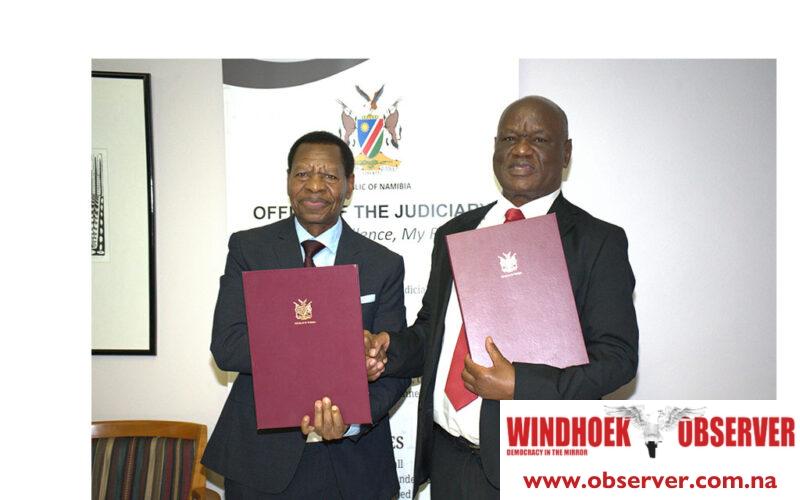Niël Terblanché
In a move towards enhancing bilateral relations, Namibia and Zimbabwe have signed a Memorandum of Understanding (MoU) to bolster cooperation in both the judicial and correctional service sectors.
The agreements, signed earlier this month, stress the commitment of both nations to improve service delivery and uphold the rule of law.
A week ago, Chief Justice Peter Shivute of Namibia and Chief Justice Luke Malaba of Zimbabwe formalised the judicial MoU, which aims to facilitate extensive collaboration between the two countries’ judicial systems.
This week, a separate MoU was signed between the Namibian Correctional Service (NCS) and the Zimbabwe Prisons and Correctional Service (ZPCS), aiming to foster cooperation in the field of correctional services.
The signing ceremony, held at the Namibian Correctional Service headquarters in Windhoek, was attended by Commissioner-General Raphael Tuhafeni Hamunyela of the NCS and Commissioner-General Moses Chihobvo of the ZPCS.
In his remarks, Commissioner-General Hamunyela expressed his gratitude to the Zimbabwean delegation and highlighted the historical cooperation between the two services.
He mentioned previous benchmarking visits and exchanges that have laid a strong foundation for this formal agreement.
The MoU includes provisions for staff training and development, exchange programs, and the establishment of a Joint Technical Committee to oversee the implementation and evaluation of the agreed initiatives.
On his part, Commissioner-General Chihobvo emphasized the importance of this cooperation for enhancing rehabilitation and reintegration programs, aligning with international best practices.
He outlined the key provisions of Zimbabwe’s new Prisons and Correctional Service Act, which includes the creation of community correctional centres and the establishment of a parole system, aimed at improving the rehabilitation and reintegration of offenders.
The judicial MoU outlines several key areas of cooperation, including training programs for judges, court officials, and legal professionals, as well as advancements in court administration and judicial education.
Chief Justice Shivute emphasised the historical cooperation between the two nations, noting the contributions of Zimbabwean judges to Namibia’s judiciary since its independence.
Justice Shivute also acknowledged the ongoing support from Zimbabwean jurists currently serving in Namibia, such as Justices Rita Makarau and Moses Chinhengo.
At the same time, Chief Justice Malaba described the MoU as a demonstration of the shared vision and commitment of both judiciaries towards enhancing their judicial systems.
He highlighted the MoU’s focus on strengthening bilateral relations, judicial training, backlog reduction strategies, and the implementation of virtual courts.
Both agreements mark a significant step towards strengthening the ties between Namibia and Zimbabwe.
The agreements reflect a mutual commitment to improving the administration of justice and correctional services, benefiting both nations and contributing to regional stability and development.
The successful implementation of these new agreements is expected to foster greater innovation, efficiency, and effectiveness in the judicial and correctional sectors of both countries.
The judicial MoU also paves the way for Namibia’s participation in the seventh Congress of the Conference of Constitutional Jurisdictions of Africa (CCJA) to be held in Victoria Falls, Zimbabwe, in November 2024.




